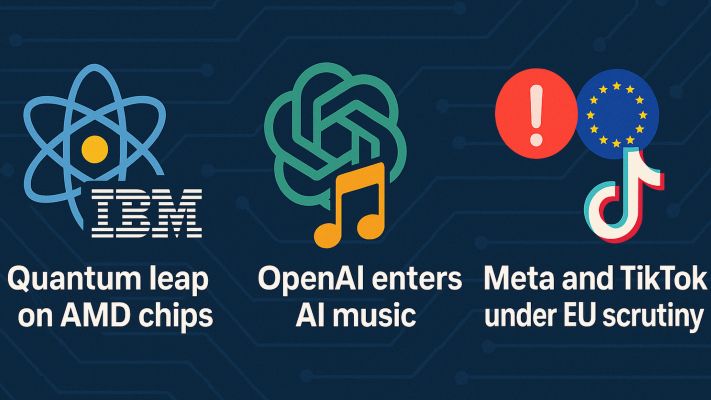AI Navigation
- articleAI Trends
- lightbulb_2AI Tips
- assistant_navigationAI Navigation
- heatHot Articles
- emergency_heat_2Hot Tips
- format_list_numberedPrompt Formatter
- psychologyTest Center(RPI)
October 25, 2025 · 24-Hour AI Briefing: IBM’s Quantum Leap on AMD Chips, OpenAI Enters AI Music, Meta and TikTok Under EU Scrutiny
Over the past 24 hours, the AI world has once again made waves across hardware, creativity, and regulation.
IBM achieved a major milestone in quantum computing, OpenAI is moving into AI-generated music, and both Meta and TikTok have drawn regulatory attention from the European Union.

1. IBM Successfully Runs Quantum Error-Correction Algorithms on AMD Chips
IBM announced that it has completed research on its key quantum error-correction algorithm a year ahead of schedule, successfully running it on standard AMD chips. The algorithm performed exceptionally well in real-world tests, achieving speeds 10 times faster than expected.
Commentary:
Error-correction algorithms are fundamental to making quantum computing practical, as they address the inherent instability of qubits under noise interference. The successful execution of this algorithm on AMD’s standard chips not only validates IBM’s algorithm but also highlights AMD’s potential in supporting quantum workloads.
Although there is still a long way to go before quantum computing becomes fully commercialized, this development marks a positive step forward—for IBM, for AMD, and for the quantum computing industry as a whole.
2. OpenAI Accelerates AI Music Development with Juilliard Collaboration
OpenAI is accelerating the development of its AI music generation model through a partnership with students from the Juilliard School, who are manually annotating musical scores to create high-quality training data. This signals OpenAI’s direct entry into competition with existing leaders Suno and Udio.
Commentary:
By collaborating with Juilliard, OpenAI demonstrates its commitment to quality and precision in training data.
While Suno and Udio already have mature products and loyal user bases, OpenAI brings unmatched model strength, technical infrastructure, and integration within the ChatGPT ecosystem.
The real question remains: will users pay for AI-generated music from OpenAI, or will they still prefer the emotional authenticity of human-made art?
3. Meta and TikTok Accused of Violating the EU Digital Services Act (DSA)
Meta and TikTok have been accused of violating the Digital Services Act (DSA) for failing to provide independent researchers with accessible data interfaces.
Both companies may contest the allegations, but if they fail to comply, they could face fines of up to 6% of their global annual revenue.
Commentary:
The DSA requires large online platforms to grant meaningful access to independent researchers to study systemic risks such as misinformation, algorithmic bias, and the protection of minors.
This case highlights the tension between corporate confidentiality and public transparency.
The EU emphasizes genuine, effective, and non-discriminatory data access—not symbolic gestures. Whether Meta and TikTok will truly open their algorithms to external scrutiny remains to be seen.
From quantum breakthroughs to AI music and regulatory challenges, today’s developments once again prove that AI is not just about technology—it’s about how humanity coexists, governs, and creates alongside it.
For more AI insights, business trends, and technological updates, visit iaiseek.com
Read more recent AI briefings:
October 24, 2025 · 24-Hour AI Briefing: Intel’s Earnings Show Mixed Recovery, Rivian Cuts Jobs, and Alibaba Unveils Its AI Glasses